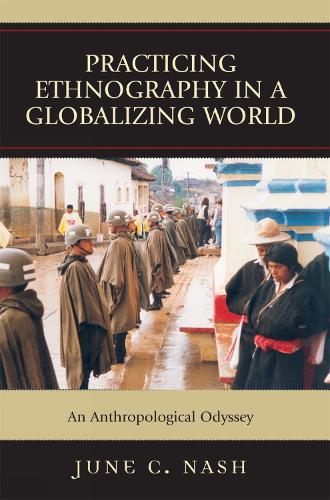
Practicing Ethnography in a Globalizing World: An Anthropological Odyssey
(Paperback)
Publishing Details
Practicing Ethnography in a Globalizing World: An Anthropological Odyssey
By (Author) June C. Nash
AltaMira Press
AltaMira Press
21st December 2006
United States
Classifications
General
Non Fiction
Anthropology
305.8
Physical Properties
Paperback
304
Width 149mm, Height 228mm, Spine 20mm
476g
Description
In this book distinguished anthropologist June Nash demonstrates how ethnography can illuminate a wide array of global problems. She describes encounters with an urban U.S. community undergoing de-industrialization, with Mandalay rice cultivators accommodating to post-World War II independence through animistic pratices, with Mayans mobilizing for autonomy, and with Andean peasants and miners confronting the International Monetary Fund. Havin worked in a great variety of cultural settings around the world, Nash challenges us to expand our anthropological horizons and to think about local problems in a global manner.
Reviews
For the past fifty years June Nash has been consistently five or ten years ahead of her time. The topics on which she has made ground breaking interventionsfeminist theory, local-global relations, ethnography of powerful institutions, consciousness and resistance, social movements, indigenous empowerment, militarization and empire, ethics and politics of research document anthropology's major preoccupations since the 1950s. This volume offers a comprehensive record of Nash's achievements confirms her place as one of the most influential and accomplished anthropologists of our times. We are well advised to read closely, to appreciate how she has shaped our field, and to glean some clues about what is coming next. -- Charles R. Hale, University of California, Santa Barbara
Practicing Anthropology in a Globalized Worldoffers students of anthropology and globalization a unique tour of the intellectual and political development of one of the most inspiring contemporary cultural anthropologists while also providing a world tour of social and cultural movements that have staked out interconnected terrains of resistance to U.S. Empire-building, global capital, and political and cultural forces of homogenization. Through in-depth essays that bring to life the contradictory politics of cultural and political economy in a transnational world, June Nash provides her readers with an insightful comparative collection that adds depth and breadth to the ethnography of globalization through time. -- Lynn Stephen, University of Oregon
[an] important volume... Summing Up: Recommended. * Choice Reviews *
This new collection of writings by June Nash is eagerly anticipated. Practicing Ethnography in a Globalizing World encompasses the full sweep of Nash's research on three continents during more than fifty years of her distinguished career as an anthropologist. These essays will be read and re-read by researchers, students, and activists who will find engaged scholarship at its best. Looking back on her long-term work on indigenous cultural identities, women in social movements, and global political economy, June Nash reflects on what we can learn from the past and how we can work toward a more just future through ethnographic practice. A tour de force. -- Florence E. Babb, Author of After Revolution: Mapping Gender and Cultural Politics in Neoliberal Nicaragua and Vada Allen Yeomans Professor of Wo
This new collection of writings by June Nash is eagerly anticipated. Practicing Ethnography in a Globalizing World encompasses the full sweep of Nash's research on three continents during more than fifty years of her distinguished career as an anthropologist. These essays will be read and re-read by researchers, students, and activists who will find engaged scholarship at its best. Looking back on her long-term work on indigenous cultural identities, women in social movements, and global political economy, June Nash reflects on what we can learn from the past and how we can work toward a more just future through ethnographic practice. A tour de force. -- Florence E. Babb, Author of After Revolution: Mapping Gender and Cultural Politics in Neoliberal Nicaragua and Vada Allen Yeomans Pro
Author Bio
June C. Nash is Distinguished Professor Emerita at the City University of New York, Graduate Center and City College. She is the author of In the Eyes of the Ancestors: Belief and Behavior in a Mayan Community; We Eat the Mines and the Mines Eat Us: Dependency and Exploitation in Bolivian Mining Communities; and a family autobiography with Juan Rojas, I Spent My Life in the Mines. As a result of her engagement with feminist and working class movements, she has also co-edited with Helen Safa Sex and Class in Latin America, and Women and Change in Latin America; with M. Patricia Fernandez Kelly, Women, Men, and the International Division of Labor; and authored From Tank Town to High Tech: The Clash of Community and Industrial Cycles.
